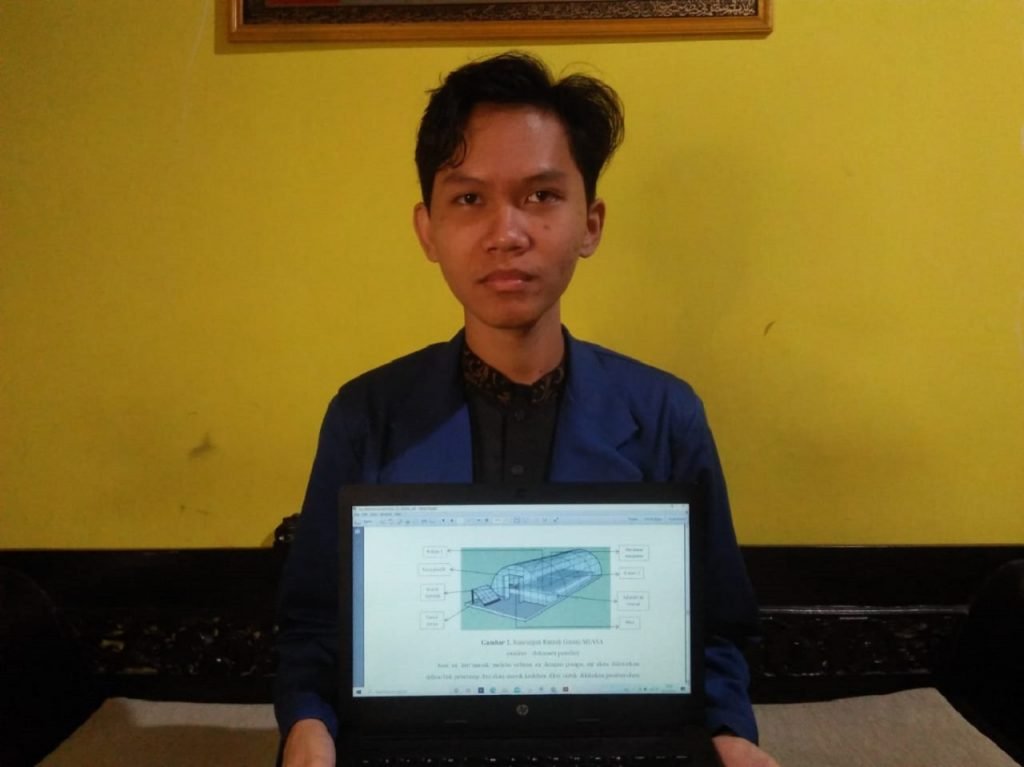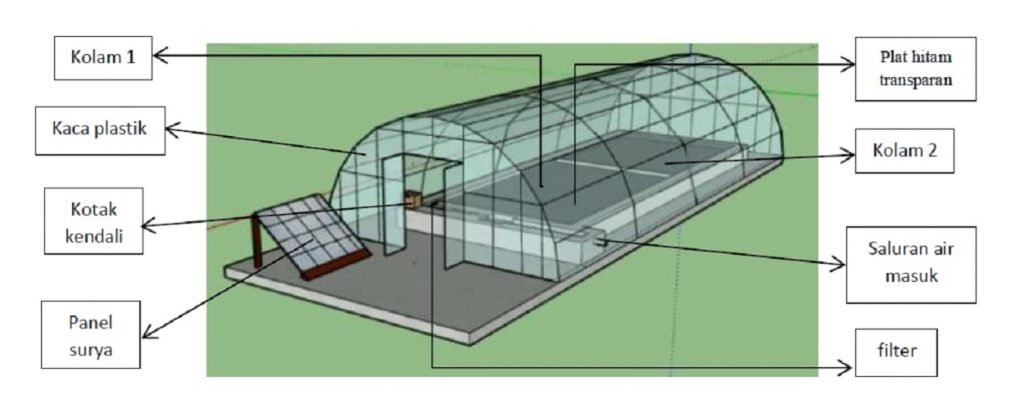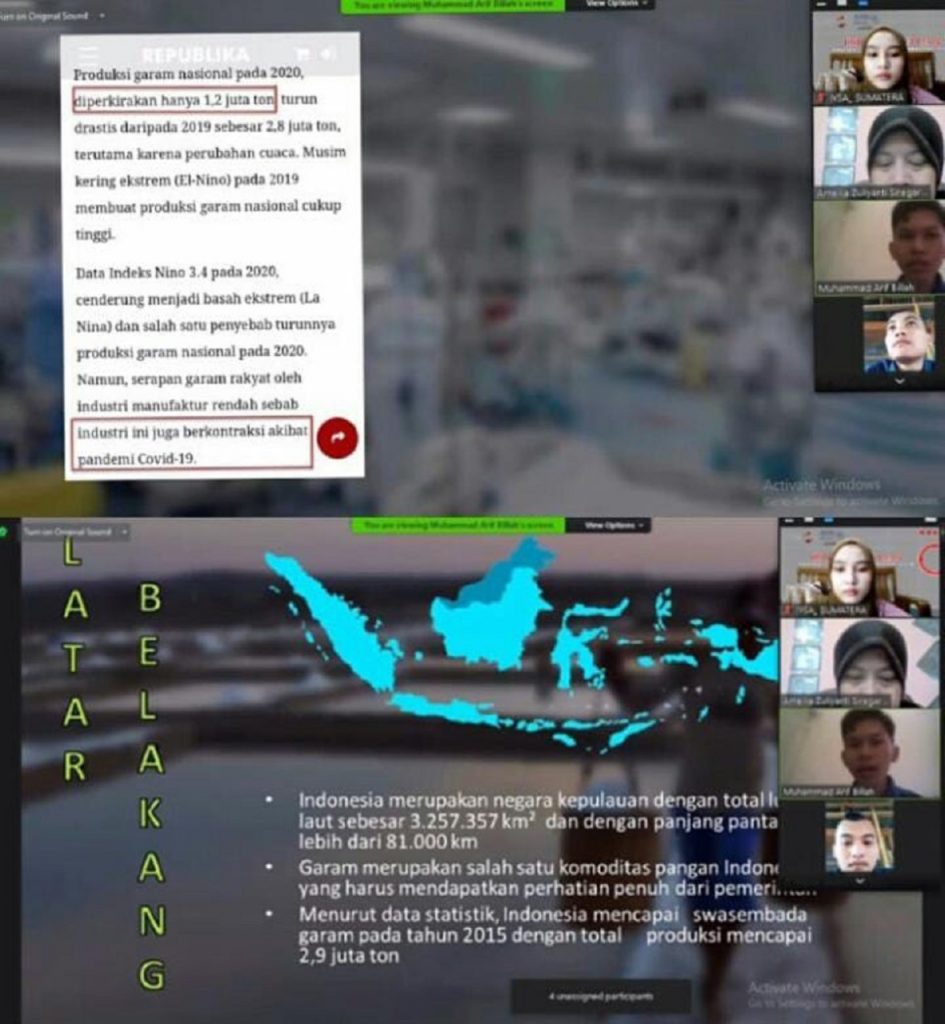Improving the Quality of Local Salt, ITS Students Initiate SHASA

Muhammad Arif Billah, a student of the ITS Civil Infrastructure Engineering Department with the idea of a Solar Cell Smart House Salt Maker (SHASA).
ITS Campus, ITS News –The quality of local salt is still considered unable to meet the industrial world’s needs, which requires high-quality salt. Departing from these problems, students of the Department of Civil Infrastructure Engineering, Sepuluh Nopember Institute of Technology (ITS), came up with a Smart House Salt Maker with solar power called SHASA.
In his idea entitled SHASA: Smart House Salt Maker with Solar Cell Power to Encourage Sustainable National Salt Self-Sufficiency in the Banyuwangi Regency, Muhammad Arif Billah wants to help increase the production of salt farmers to be even better.
The student, who is familiarly called Arif, said that the Covid-19 pandemic that had spread had had a lot of influence in various fields, including the salt industry sector. Especially with the increasingly erratic weather today. Not only causing a sluggish salt price, but this condition also makes farmers, especially in the Banyuwangi area, have difficulty in the production process. This is suspected to be the reason for the government to increase the volume of salt imports.

Overview of salt houses innovated by Muhammad Arif Billah, ITS Civil Infrastructure Engineering student
Not wanting this to continue, Arif is interested in creating a pond system that can produce salt automatically without being affected by the weather. This system which he eventually named SHASA. “It is a salt house in a semicircular shape, and underneath there is a salt pool and a heating lamp,” said the young man born in Banyuwangi, July 14, 2002.
The lights, he continued, are controlled using Arduino and sensors that function to heat the seawater that enters the salt house. Besides, SHASA is equipped with four other sensors, including a light sensor, a rain sensor, a salinity sensor, and a temperature and humidity sensor. “These sensors have an important role in detecting the surrounding weather conditions,” said the student who is actively part of the ITS Reasoning Team.
Arif gave an example if the weather starts to get cloudy and there is rain, the heating system from SHASA will work so that old water or dripping water from the sea can still be processed. Although this system is considered uneconomical for salt farmers, the actual expenditure is cheaper when compared to the amount of salt produced.
“For a pool measuring 7 × 8 meters, it is predicted that it will be able to produce as much as 500 kilograms of salt, and if the price of salt is in the range of Rp. 500 per kilogram, the profit generated can be more,” he explained.

Presentation of Muhammad Arif Billah in the Online National Competition organized by the Indonesian Young Scientist Association (IYSA) Sumatra, last January
Arif admitted that he chose Banyuwangi as the object of his case study because the weather and climate in the City of Gandrung were suitable as a salt land. Moreover, the city is also synonymous with Tuban City, which has relatively high rainfall. Therefore, he hopes that this idea will be a choice for farmers in optimizing salt production and quality.
His persistence in writing this idea led to winning a silver medal in the Online National Essay Competition organized by the Indonesian Young Scientist Association (IYSA) Sumatra last January. “The jury responded to this idea with a positive response. Besides, they think that this idea can provide benefits if appropriately implemented, “added the student who often won various essay competitions.
In the future, Arif hopes that the idea will not only be in the form of an idea but can be realized in real life. He also hopes that this bright idea can be developed and glimpsed by stakeholders such as the government and other institutions. “Hopefully, local salt can continue to grow so that it can reduce dependence on imports,” he hoped. (ITS Public Relations)
Reporter: Erchi Ad’ha Loyensya
Related News
-
ITS Ranks as the Best University in Marketing in Indonesia
ITS Campus, ITS News — Continuously striving to meet industry needs has successfully brought Institut Teknologi Sepuluh Nopember (ITS)
February 26, 2021 15:02 -
ITS Academic Staff Initiates Work Safety Revolution through Digital Technology
ITS Campus, ITS News — Based on existing report data, 17 kinds of accidents mostly occur due to the lack
February 26, 2021 15:02 -
ITS Collaboration with BPBD East Java, Launching VR Disaster Simulation
ITS Campus, ITS News — Supporting anticipation of disasters and continuing to educate the public, Institut Teknologi Sepuluh Nopember
February 26, 2021 15:02 -
Supporting the Implementation of Innovative Ideas, ITS and IYSA Hold International Competition
ITS Campus, ITS News — Institut Teknologi Sepuluh Nopember (ITS) has once again proven its commitment to supporting the
February 26, 2021 15:02
